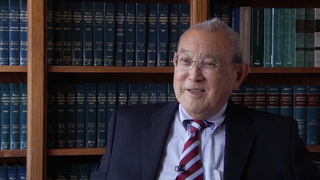Interviews
The White House Will Have to Wait
One of the first major appointments I received, it was from President Jimmy Carter. They created an immigration commission. And they had several senators, several house members from the Judiciary Committee, representatives from the Cabinet members, and they were going to have just four regular folks. And I guess they were looking for an Asian. I was skiing up in Utah and I get a call. My friend said this—my UCLA classmate said this, “Rose you got a call from the White House!” I said, “Tell them I’m busy.” Anyway, I took the call and they said, “we want you to serve on this commission.” And I said, “One, I don’t know anything about immigration; and number two, I’ll name you some other people who would be good.” Anyway, they said, “No, you’ve already been named so you need to come.” That was just a wonderful opportunity for me because although I knew nothing about immigration, I was able to connect with the leadership of Washington, the White House, and the Hill. And for many many years, we were able to use those connections for redress and to establish Manzanar as a national historic site.
Date: July 17, 2013
Location: California, US
Interviewer: Sean Hamamoto
Contributed by: Watase Media Arts Center, Japanese American National Museum; Japanese American Bar Association





